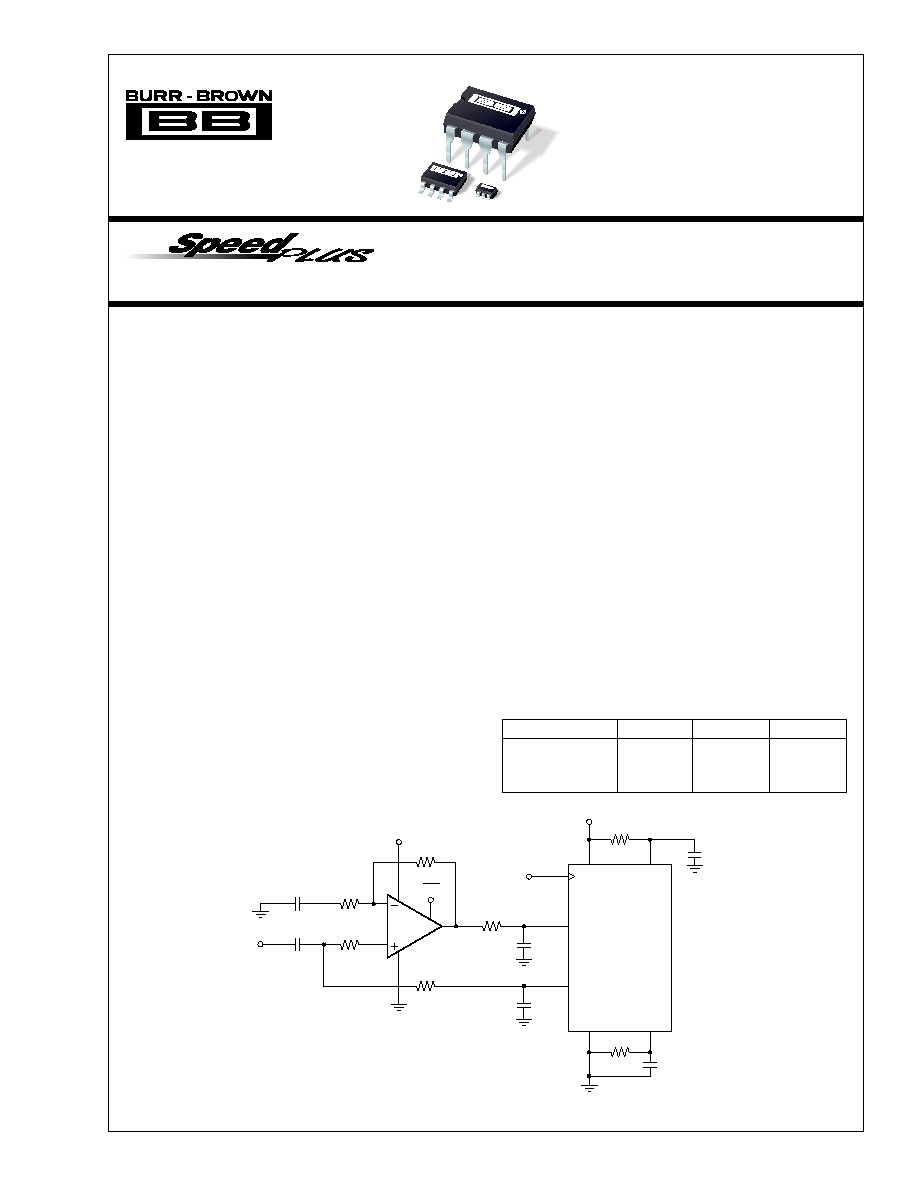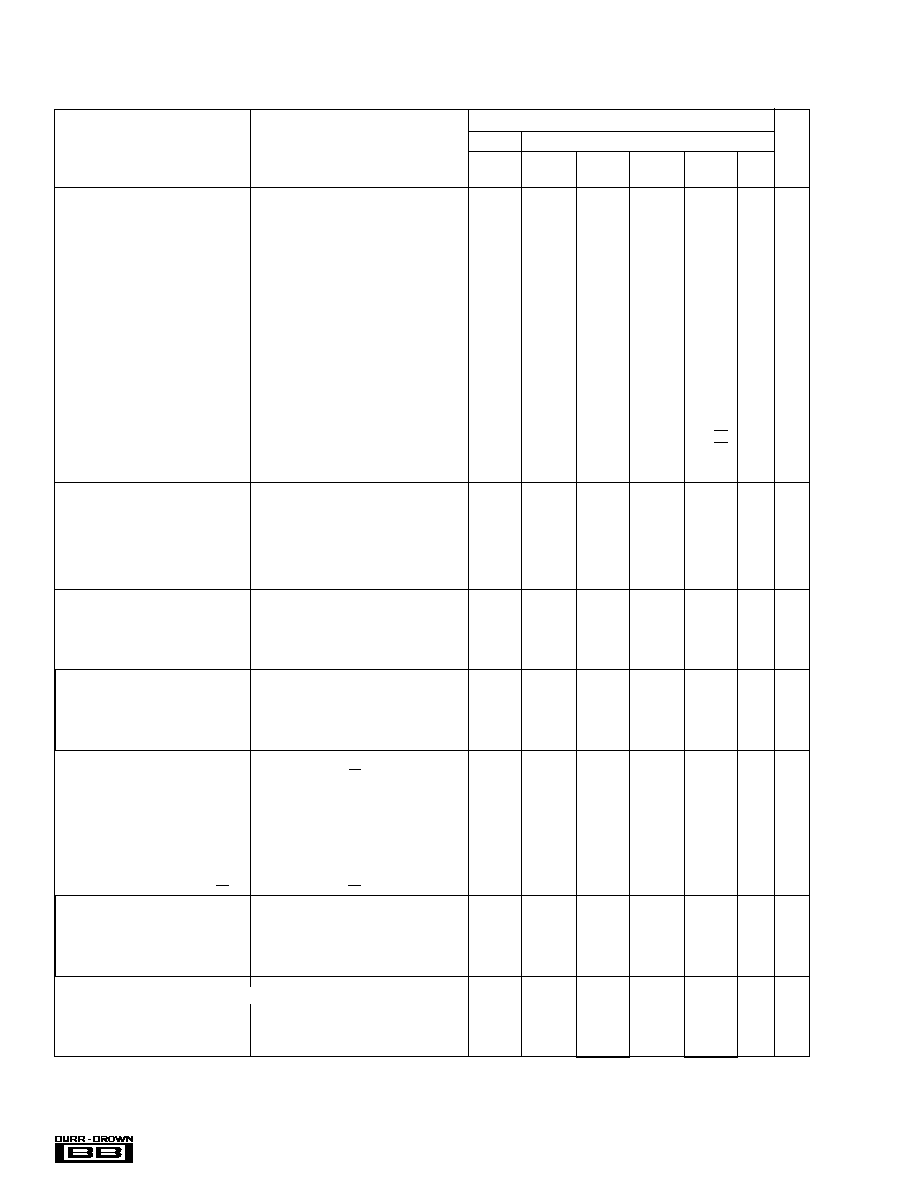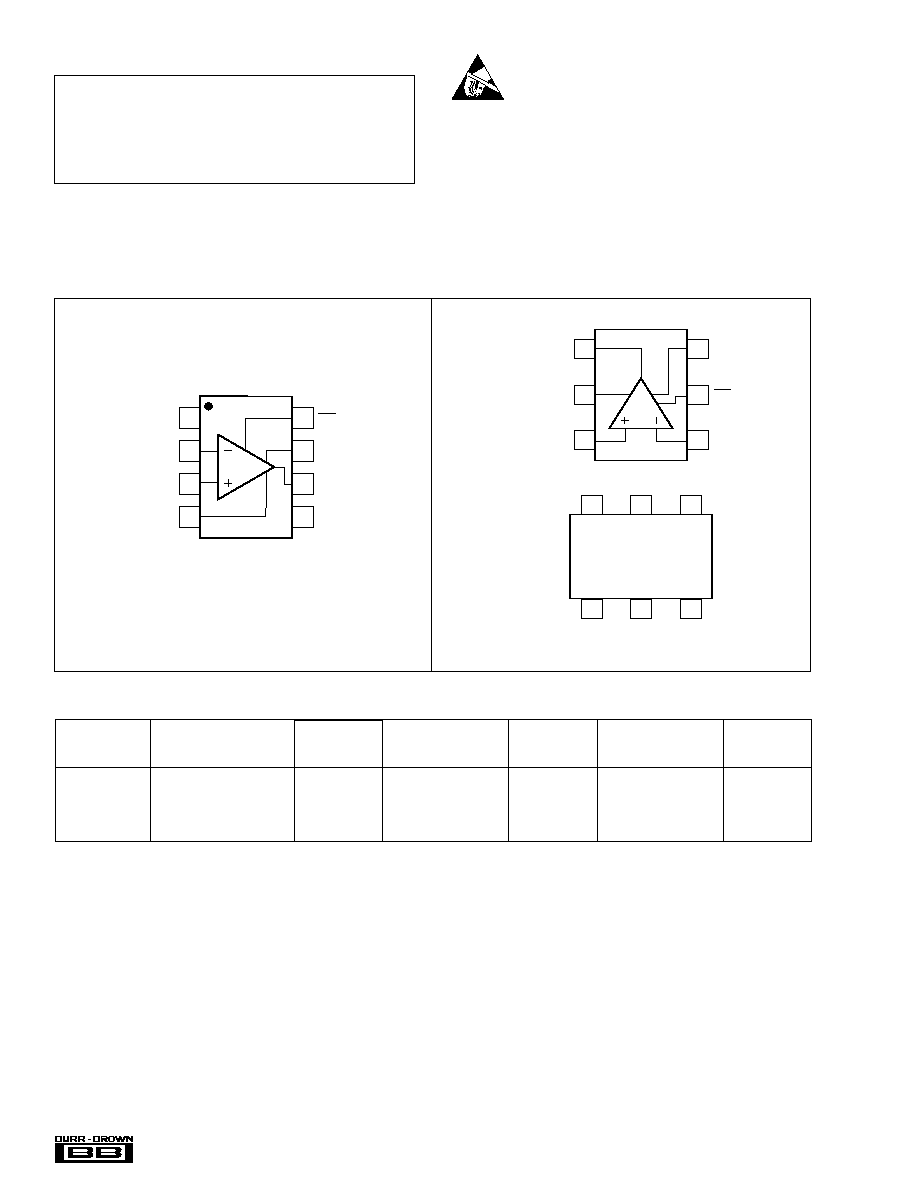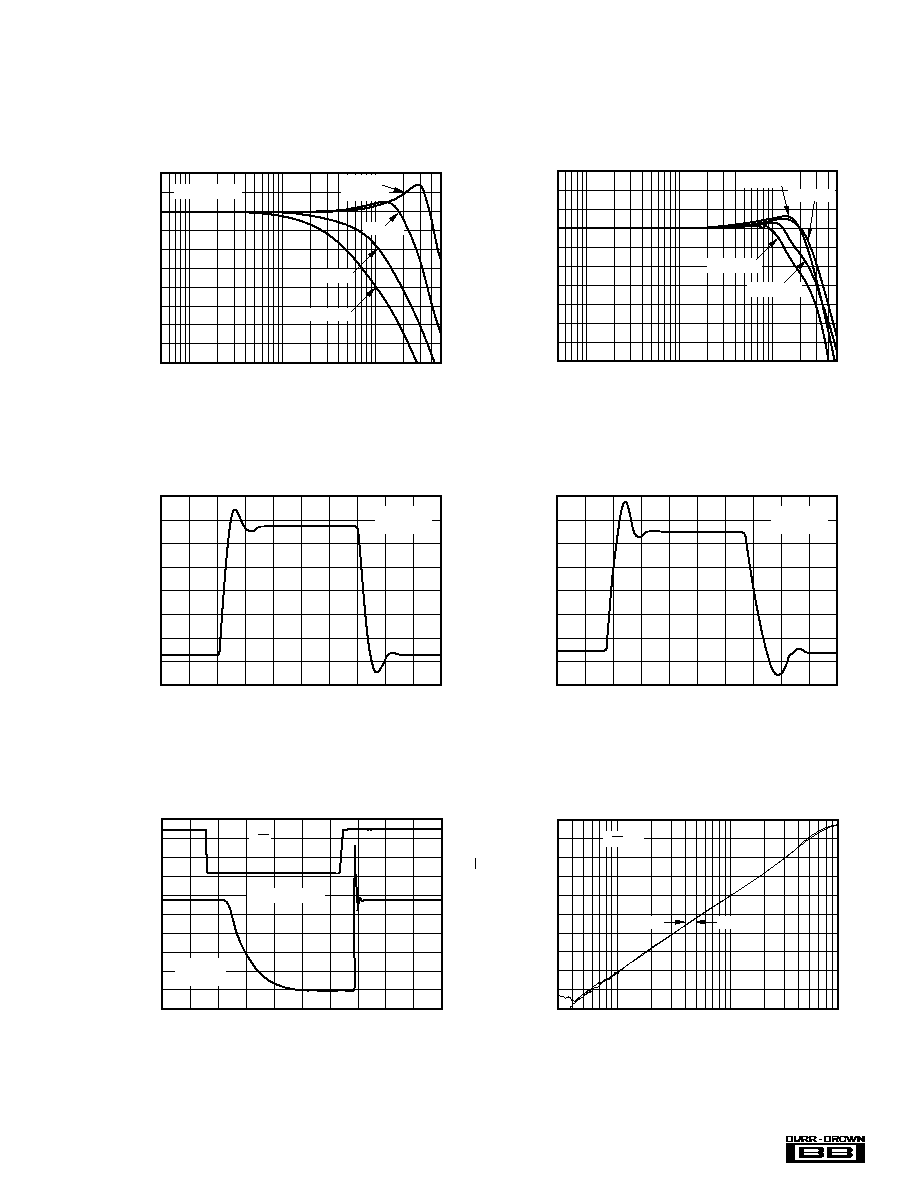 | –≠–ª–µ–∫—Ç—Ä–æ–Ω–Ω—ã–π –∫–æ–º–ø–æ–Ω–µ–Ω—Ç: OPA680 | –°–∫–∞—á–∞—Ç—å:  PDF PDF  ZIP ZIP |

1
Æ
OPA680
International Airport Industrial Park ∑ Mailing Address: PO Box 11400, Tucson, AZ 85734 ∑ Street Address: 6730 S. Tucson Blvd., Tucson, AZ 85706 ∑ Tel: (520) 746-1111
Twx: 910-952-1111 ∑ Internet: http://www.burr-brown.com/ ∑ Cable: BBRCORP ∑ Telex: 066-6491 ∑ FAX: (520) 889-1510 ∑ Immediate Product Info: (800) 548-6132
Wideband, Voltage Feedback
OPERATIONAL AMPLIFIER With Disable
TM
Æ
FEATURES
q
WIDEBAND +5V OPERATION: 220MHz (G = 2)
q
UNITY GAIN STABLE: 400MHz (G = 1)
q
HIGH OUTPUT CURRENT: 150mA
q
OUTPUT VOLTAGE SWING:
±
4.0V
q
HIGH SLEW RATE: 1800V/
µ
s
q
LOW SUPPLY CURRENT: 6.4mA
q
LOW DISABLED CURRENT: 300
µ
A
q
ENABLE/DISABLE TIME: 25ns/100ns
APPLICATIONS
q
VIDEO LINE DRIVER
q
xDSL LINE DRIVER/RECEIVER
q
HIGH SPEED IMAGING CHANNELS
q
ADC BUFFERS
q
PORTABLE INSTRUMENTS
q
TRANSIMPEDANCE AMPLIFIERS
q
ACTIVE FILTERS
DESCRIPTION
The OPA680 represents a major step forward in unity gain
stable, voltage feedback op amps. A new internal architec-
ture provides slew rate and full power bandwidth previously
found only in wideband current feedback op amps. A new
output stage architecture delivers high currents with a mini-
mal headroom requirement. These combine to give excep-
tional single supply operation. Using a single +5V supply,
the OPA680 can deliver a 1V to 4V output swing with over
100mA drive current and 150MHz bandwidth. This combi-
nation of features makes the OPA680 an ideal RGB line
driver or single supply ADC input driver.
The OPA680's low 6.4mA supply current is precisely
trimmed at 25
∞
C. This trim, along with low temperature
drift, guarantees lower maximum supply current than com-
peting products. System power may be reduced further using
the optional disable control pin. Leaving this disable pin
open, or holding it high, will operate the OPA680 normally.
If pulled low, the OPA680 supply current drops to less than
300
µ
A while the output goes to a high impedance state. This
feature may be used for either power savings or to imple-
ment video MUX applications.
OPA680
OPA680
OPA680
OPA680
OPA680 RELATED PRODUCTS
SINGLES
DUALS
TRIPLES
Voltage Feedback
OPA680
OPA2680
OPA3680
Current Feedback
OPA681
OPA2681
OPA3681
Fixed Gain
OPA682
OPA2682
OPA3682
©
1997 Burr-Brown Corporation
PDS-1426E
Printed in U.S.A. October, 1999
OPA680
+5V
DIS
40
2Vp-p
V
IN
1.15k
1.2k
0.1
µ
F
22pF
ADS822
10-Bit
40MSPS
3k
Gnd
CM
+2.5V
Analog
Input
REFB
+V
S
+5V
Clock
REFT
0.1
µ
F
+1.5V
3k
+3.5V
0.1
µ
F
0.1
µ
F
0.1
µ
F
0.5Vp-p
400
50
Single-Supply, High Speed, 10-Bit Digitzer

2
OPA680
Æ
SPECIFICATIONS: V
S
=
±
5V
R
F
= 402
, R
L
= 100
, and G = +2
,
(Figure 1 for AC performance only), unless otherwise noted.
OPA680P, U, N
TYP
GUARANTEED
0
∞
C to
≠40
∞
C to
MIN/
TEST
PARAMETER
CONDITIONS
+25
∞
C
+25
∞
C
(2)
70
∞
C
(3)
+85
∞
C
(3)
UNITS
MAX
LEVEL
(1)
AC PERFORMANCE (Figure 1)
Small Signal Bandwidth
G = +1, V
O
= 0.5Vp-p, R
F
= 25
400
MHz
typ
C
G = +2, V
O
= 0.5Vp-p
220
210
200
190
MHz
min
B
G = +10, V
O
= 0.5Vp-p
30
20
20
20
MHz
min
B
Gain-Bandwidth Product
G
10
300
200
200
200
MHz
min
B
Bandwidth for 0.1dB Gain Flatness
G = +2, V
O
< 0.5Vp-p
30
MHz
typ
C
Peaking at a Gain of +1
V
O
< 0.5Vp-p
4
dB
typ
C
Large-Signal Bandwidth
G = +2, V
O
= 5Vp-p
175
MHz
typ
C
Slew Rate
G = +2, 4V Step
1800
1400
1200
900
V/
µ
s
min
B
Rise/Fall Time
G = +2, V
O
= 0.5V Step
1.4
ns
typ
C
G = +2, V
O
= 5V Step
2.8
ns
typ
C
Settling Time to 0.02%
G = +2, V
O
= 2V Step
12
ns
typ
C
0.1%
G = +2, V
O
= 2V Step
8
ns
typ
C
Harmonic Distortion
G = +2, f = 5MHz, V
O
= 2Vp-p
2nd Harmonic
R
L
= 100
≠68
≠63
≠62
≠60
dBc
max
B
R
L
500
≠80
≠70
≠68
≠65
dBc
max
B
3rd Harmonic
R
L
= 100
≠80
≠75
≠73
≠70
dBc
max
B
R
L
500
≠88
≠85
≠83
≠80
dBc
max
B
Input Voltage Noise
f > 1MHz
4.8
5.3
5.9
6.1
nV/
Hz
max
B
Input Current Noise
f > 1MHz
2.5
2.8
3.0
3.6
pA/
Hz
max
B
Differential Gain
G = +2, NTSC, V
O
= 1.4Vp, R
L
= 150
0.05
%
typ
C
Differential Phase
G = +2, NTSC, V
O
= 1.4Vp, R
L
= 150
0.03
deg
typ
C
DC PERFORMANCE
(4)
Open-Loop Voltage Gain (A
OL
)
V
O
= 0V, R
L
= 100
58
54
52
50
dB
min
A
Input Offset Voltage
V
CM
= 0V
±
1.0
±
4.5
±
5.2
±
6.0
mV
max
A
Average Offset Voltage Drift
V
CM
= 0V
±
10
±
10
µ
V/
∞
C
max
B
Input Bias Current
V
CM
= 0V
+8
+14
+19
+32
µ
A
max
A
Average Bias Current Drift (magnitude)
V
CM
= 0V
≠70
≠150
nA/
∞
C
max
B
Input Offset Current
V
CM
= 0V
±
0.1
±
0.7
±
1.0
±
1.2
µ
A
max
A
Average Offset Current Drift
V
CM
= 0V
±
1
±
1.5
nA/
∞
C
max
B
INPUT
Common-Mode Input Range (CMIR)
(5)
±
3.5
±
3.4
±
3.3
±
3.2
V
min
A
Common-Mode Rejection Ratio (CMRR)
V
CM
=
±
1V
59
56
53
52
dB
min
A
Input Impedance
Differential-Mode
V
CM
= 0
190 || 0.6
k
|| pF
typ
C
Common-Mode
V
CM
= 0
3.2 || 0.9
M
|| pF
typ
C
OUTPUT
Voltage Output Swing
No Load
±
4.0
±
3.8
±
3.7
±
3.6
V
min
A
100
Load
±
3.9
±
3.7
±
3.6
±
3.3
V
min
A
Current Output, Sourcing
V
O
= 0
+190
+160
+140
+80
mA
min
A
Current Output, Sinking
V
O
= 0
≠150
≠135
≠130
≠80
mA
min
A
Closed-Loop Output Impedance
G = +2, f = 100kHz
0.03
typ
C
DISABLE (Disabled Low)
Power Down Supply Current (+V
S
)
V
DIS
= 0
≠300
µ
A
typ
C
Disable Time
100
ns
typ
C
Enable Time
25
ns
typ
C
Off Isolation
G = +2, 5MHz
70
dB
typ
C
Output Capacitance in Disable
4
pF
typ
C
Turn On Glitch
G = +2, R
L
= 150
, V
IN
= 0
±
50
mV
typ
C
Turn Off Glitch
G = +2, R
L
= 150
, V
IN
= 0
±
20
mV
typ
C
Enable Voltage
3.3
3.5
3.6
3.7
V
min
A
Disable Voltage
1.8
1.7
1.6
1.5
V
max
A
Control Pin Input Bias Current (V
DIS
)
V
DIS
= 0
100
160
160
160
µ
A
max
A
POWER SUPPLY
Specified Operating Voltage
±
5
V
typ
C
Maximum Operating Voltage Range
±
6
±
6
±
6
V
max
A
Max Quiescent Current
V
S
=
±
5V
6.4
6.8
7.0
7.2
mA
max
A
Min Quiescent Current
V
S
=
±
5V
6.4
6.0
6.0
5.3
mA
min
A
Power Supply Rejection Ratio (+PSRR)
Input Referred
65
60
58
56
dB
min
A
THERMAL CHARACTERISTICS
Specified Operating Range P, U, N Package
≠40 to +85
∞
C
typ
C
Thermal Resistance,
JA
Junction-to-Ambient
P
8-Pin DIP
100
∞
C/W
typ
C
U
SO-8
125
∞
C/W
typ
C
N
SOT23-6
150
∞
C/W
typ
C
NOTES: (1) Test Levels: (A) 100% tested at 25
∞
C. Over temperature limits by characterization and simulation. (B) Limits set by characterization and simulation.
(C) Typical value only for information. (2) Junction Temperature = Ambient for 25
∞
C guaranteed specifications. (3) Junction Temperature = Ambient at low temperature
limit: Junction Temperature = Ambient +23
∞
C at high temperature limit for over temperature guaranteed specifications. (4) Current is considered positive out of node.
V
CM
is the input common-mode voltage. (5) Tested < 3dB below minimum CMRR specification at
±
CMIR limits.

3
Æ
OPA680
SPECIFICATIONS: V
S
= +5V
R
F
= 402
, R
L
= 100
to V
S
/2, G = +2
,
(Figure 2 for AC performance only), unless otherwise noted.
OPA680P, U, N
TYP
GUARANTEED
0
∞
C to
≠40
∞
C to
MIN/
TEST
PARAMETER
CONDITIONS
+25
∞
C
+25
∞
C
(2)
70
∞
C
(3)
+85
∞
C
(3)
UNITS
MAX
LEVEL
(1)
AC PERFORMANCE (Figure 2)
Small Signal Bandwidth
G = +1, V
O
< 0.5Vp-p, R
F
=
±
25
300
MHz
typ
C
G = +2, V
O
< 0.5Vp-p
220
160
160
140
MHz
min
B
G = +10, V
O
< 0.5Vp-p
25
20
19
18
MHz
min
B
Gain-Bandwidth Product
G
10
250
200
190
180
MHz
min
B
Bandwidth for 0.1dB Gain Flatness
G = +2, V
O
< 0.5Vp-p
20
MHz
typ
C
Peaking at a Gain of +1
V
O
< 0.5Vp-p
5
dB
typ
C
Large-Signal Bandwidth
G = +2, V
O
= 2Vp-p
200
MHz
typ
C
Slew Rate
G = +2, 2V Step
1000
700
670
550
V/
µ
s
min
B
Rise Time/Fall Time
G = +2, V
O
= 0.5V Step
1.6
ns
typ
C
G = +2, V
O
= 2V Step
2.0
ns
typ
C
Settling Time to 0.02%
G = +2, V
O
= 2V Step
12
ns
typ
C
0.1%
G = +2, V
O
= 2V Step
8
ns
typ
C
Harmonic Distortion
G = +2, f = 5MHz, V
O
= 2Vp-p
2nd Harmonic
R
L
= 100
to V
S
/2
≠60
≠55
≠54
≠51
dBc
max
B
R
L
500
to V
S
/2
≠70
≠66
≠63
≠59
dBc
max
B
3rd Harmonic
R
L
= 100
to V
S
/2
≠72
≠66
≠64
≠62
dBc
max
B
R
L
500
to V
S
/2
≠80
≠76
≠74
≠71
dBc
max
B
Input Voltage Noise
f > 1MHz
5
5.3
6.0
6.2
nV/
Hz
max
B
Input Current Noise
f > 1MHz
2.5
2.8
3.0
3.4
pA/
Hz
max
B
Differential Gain
G = +2, NTSC, V
O
= 1.4Vp, R
L
= 150 to V
S
/2
0.06
%
typ
C
Differential Phase
G = +2, NTSC, V
O
= 1.4Vp, R
L
= 150 to V
S
/2
0.03
deg
typ
C
DC PERFORMANCE
(4)
Open-Loop Voltage Gain (A
OL
)
V
O
= 2.5V, R
L
= 100
to 2.5V
58
54
52
50
dB
min
A
Input Offset Voltage
V
CM
= 2.5V
±
2.0
±
6.0
±
7
±
8.5
mV
max
A
Average Offset Voltage Drift
V
CM
= 2.5V
≠10
≠12
µ
V/
∞
C
max
B
Input Bias Current
V
CM
= 2.5V
+8
+15
+18
+32
µ
A
max
A
Average Bias Current Drift (magnitude)
V
CM
= 2.5V
≠52
≠80
nA/
∞
C
max
B
Input Offset Current
V
CM
= 2.5V
±
0.1
±
0.6
±
1.0
±
1.2
µ
A
max
A
Average Offset Current Drift
V
CM
= 2.5V
±
0.5
±
1.0
nA/
∞
C
max
B
INPUT
Least Positive Input Voltage
(5)
1.5
1.6
1.7
1.8
V
max
A
Most Positive Input Voltage
(5)
3.5
3.4
3.3
3.2
V
min
A
Common-Mode Rejection Ratio (CMRR)
V
CM
= 2.5V
±
0.5V
59
56
53
52
dB
min
A
Input Impedance
Differential-Mode
V
CM
= 2.5V
92 || 1.4
k
|| pF
typ
C
Common-Mode
V
CM
= 2.5V
2.2 || 1.5
M
|| pF
typ
C
OUTPUT
Most Positive Output Voltage
No Load
4
3.8
3.6
3.5
V
min
A
R
L
= 100
to 2.5V
3.9
3.7
3.5
3.4
V
min
A
Least Positive Output Voltage
No Load
1
1.2
1.4
1.5
V
min
A
R
L
= 100
to 2.5V
1.1
1.3
1.5
1.7
V
max
A
Current Output, Sourcing
+150
+110
+110
+60
mA
max
A
Current Output, Sinking
≠110
≠80
≠70
≠50
mA
min
A
Closed-Loop Output Impedance
G =+2, f = 100kHz
0.03
typ
C
DISABLE (Disable Low)
Power Down Supply Current (+V
S
)
V
DIS
= 0
≠250
µ
A
typ
C
Disable Time
100
ns
typ
C
Enable Time
25
ns
typ
C
Off Isolation
G = +2, 5MHz
65
dB
typ
C
Output Capacitance in Disable
4
pF
typ
C
Turn On Glitch
G = +2, R
L
= 150
, V
IN
= V
S
/2
±
50
mV
typ
C
Turn Off Glitch
G = +2, R
L
= 150
, V
IN
= V
S
/2
±
20
mV
typ
C
Enable Voltage
3.3
3.5
3.6
3.7
V
min
A
Disable Voltage
1.8
1.7
1.6
1.5
V
max
A
Control Pin Input Bias Current (V
DIS
)
V
DIS
= 0
100
µ
A
typ
C
POWER SUPPLY
Specified Single Supply Operating Voltage
5
V
typ
C
Maximum Single Supply Operating Voltage
12
12
12
V
max
B
Max Quiescent Current
V
S
= +5V
5.1
6.0
6.0
6.0
mA
max
A
Min Quiescent Current
V
S
= +5V
5.1
4.0
4.0
3.8
mA
min
A
Power Supply Rejection Ratio (+PSRR)
Input Referred
55
dB
typ
C
TEMPERATURE RANGE
Specification: P, U, N
≠40 to +85
∞
C
typ
C
Thermal Resistance,
JA
Junction-to-Ambient
P
8-Pin DIP
100
∞
C/W
typ
C
U
SO-8
125
∞
C/W
typ
C
N
SOT23-6
150
∞
C/W
typ
C
NOTES: (1) Test Levels: (A) 100% tested at 25
∞
C. Over temperature limits by characterization and simulation. (B) Limits set by characterization and simulation.
(C) Typical value only for information. (2) Junction Temperature = Ambient for 25
∞
C guaranteed specifications. (3) Junction Temperature = Ambient at low temperature
limit: Junction Temperature = Ambient +23
∞
C at high temperature limit for over temperature guaranteed specifications. (4) Current is considered positive out of node.
V
CM
is the input common-mode voltage. (5) Tested < 3dB below minimum CMRR specification at
±
CMIR limits.

4
OPA680
Æ
1
2
3
4
8
7
6
5
NC
Inverting Input
Non-Inverting Input
≠V
S
DIS
+V
S
Output
NC
PIN CONFIGURATIONS
Top View
DIP/SO-8
ABSOLUTE MAXIMUM RATINGS
Power Supply ...............................................................................
±
6.5V
DC
Internal Power Dissipation ..................................... See Thermal Analysis
Differential Input Voltage ..................................................................
±
1.2V
Input Voltage Range ............................................................................
±
V
S
Storage Temperature Range: P, U, N ........................... ≠40
∞
C to +125
∞
C
Lead Temperature (soldering, 10s) .............................................. +300
∞
C
Junction Temperature (T
J
) ........................................................... +175
∞
C
ELECTROSTATIC
DISCHARGE SENSITIVITY
Electrostatic discharge can cause damage ranging from perfor-
mance degradation to complete device failure. Burr-Brown Corpo-
ration recommends that all integrated circuits be handled and stored
using appropriate ESD protection methods.
ESD damage can range from subtle performance degradation to
complete device failure. Precision integrated circuits may be more
susceptible to damage because very small parametric changes
could cause the device not to meet published specifications.
The information provided herein is believed to be reliable; however, BURR-BROWN assumes no responsibility for inaccuracies or omissions. BURR-BROWN assumes no
responsibility for the use of this information, and all use of such information shall be entirely at the user's own risk. Prices and specifications are subject to change without notice.
No patent rights or licenses to any of the circuits described herein are implied or granted to any third party. BURR-BROWN does not authorize or warrant any BURR-BROWN product
for use in life support devices and/or systems.
1
2
3
6
5
4
Output
≠V
S
Non-Inverting Input
+V
S
DIS
Inverting Input
A80
1
2
3
6
5
4
Pin Orientation/Package Marking
Top View
SOT23-6
PACKAGE
SPECIFIED
DRAWING
TEMPERATURE
PACKAGE
ORDERING
TRANSPORT
PRODUCT
PACKAGE
NUMBER
(1)
RANGE
MARKING
NUMBER
(2)
MEDIA
OPA680P
8-Pin Plastic DIP
006
≠40
∞
C to +85
∞
C
OPA680P
OPA680P
Rails
OPA680U
SO-8 Surface-Mount
182
≠40
∞
C to +85
∞
C
OPA680U
OPA680U
Rails
"
"
"
"
"
OPA680U/2K5
Tape and Reel
OPA680N
6-Pin SOT23-6
332
≠40
∞
C to +85
∞
C
A80
OPA680N/250
Tape and Reel
"
"
"
"
"
OPA680N/3K
Tape and Reel
NOTES: (1) For detailed drawing and dimension table, please see end of data sheet, or Appendix C of Burr-Brown IC Data Book. (2) Models with a slash (/) are
available only in Tape and Reel in the quantities indicated (e.g., /2K5 indicates 2500 devices per reel). Ordering 3000 pieces of "OPA680N/3K" will get a single
3000-piece Tape and Reel. For detailed Tape and Reel mechanical information, refer to Appendix B of Burr-Brown IC Data Book.
PACKAGE/ORDERING INFORMATION

5
Æ
OPA680
TYPICAL PERFORMANCE CURVES: V
S
=
±
5V
At T
A
= +25
∞
C, G = +2, R
F
= 402
, and R
L
= 100
, unless otherwise noted. See Figure 1.
15
12
9
6
3
0
≠3
≠6
≠9
≠12
≠15
LARGE-SIGNAL FREQUENCY RESPONSE
Frequency (MHz)
0.5
10
100
500
V
O
= 7Vp-p
V
O
= 1Vp-p
V
O
= 2Vp-p
V
O
= 4Vp-p
Gain (3dB/div)
400
300
200
100
0
≠100
≠200
≠300
≠400
SMALL-SIGNAL PULSE RESPONSE
Time (5ns/div)
Output Voltage (100mV/div)
G = +2
V
O
= 0.5Vp-p
+4
+3
+2
+1
0
≠1
≠2
≠3
≠4
LARGE-SIGNAL PULSE RESPONSE
Time (5ns/div)
Output Voltage (1V/div)
G = +2
V
O
= 5Vp-p
6
3
0
≠3
≠6
≠9
≠12
≠15
≠18
≠21
≠24
SMALL-SIGNAL FREQUENCY RESPONSE
Frequency (MHz)
Normalized Gain (3dB/div)
0.5
10
100
500
G = +5
V
O
= 0.5Vp-p
G = +10
G = +2
G = +1
R
F
= 25
DISABLED FEEDTHROUGH vs FREQUENCY
≠45
≠50
≠55
≠60
≠65
≠70
≠75
≠80
≠85
≠90
≠95
Frequency (MHz)
1
10
100
Feedthrough (5dB/div)
Forward
V
DIS
= 0
Reverse
2.0
1.6
0.8
0.4
0
6.0
4.0
2.0
0
LARGE-SIGNAL DISABLE/ENABLE RESPONSE
Time (50ns/div)
V
O
(0.4V/div)
V
DIS
(2V/div)
Output Voltage
V
DIS
G = +2
V
IN
= +1V




